Photographs: Andrew Biraj/Reuters
A lot is at stake in the elections to the lower house of Afghan Parliament, argues Dr Shanthie Mariet D'Souza.
The elections to the Wolesi Jirga (the Lower House of Afghan Parliament) scheduled September 18 has raised crucial questions on the feasibility of holding elections in a warring nation. While many Afghans see the conduct of elections as a ray of hope, many international observers remain sceptical. The repeat of allegations of fraud during the presidential elections of 2009, combined with rising violence and pervasive insecurity, are seen as 'spoilers' and definitive road blocks to the nascent democratic institution building process in war-ravaged country .
A lot is at stake on the conduct of peaceful parliamentary election in Afghanistan. Amidst reigning possibilities of Taliban attacks, a less violent election process, compared to the presidential elections last year, would possibly mean declining ability of the extremists to disrupt the political process. More importantly, it would also mean that the present counter-insurgency operations by the international forces are progressing in the right direction.
Ray of hope as Afghanistan goes to polls
Image: A worker waits to unload election materials from a truck at a polling centre outside Kabul.Photographs: Fayaz Kabli/Reuters
As Afghans get ready to vote in elections, the United States & NATO forces are carrying out Operation Hamkari (the Dari word for cooperation) in the Kandahar city, the spiritual capital of the Taliban. Actual progress of the operation, directed at weakening the influence and presence of the Taliban and their supporters in the area, is unknown, though military commanders have claimed to have disrupted lower and mid-level Taliban commanders.
However, a crucial part of the operation -- gaining control over Kandahar's surrounding districts, from where the Taliban gets a steady supply of fighters and weapons -- has been exceedingly slow.
For example, attempts to control Zhari district has been ongoing for at least four months with little progress on the ground. In addition, the ISAF has an asymmetric fight on its hands in the previously peaceful northern and western parts of the country, where anti-government forces have coalesced with the Taliban insurgency.
Marked increase in number of women candidates
Image: Afghan women collect drinking water from a handpump in a village near Kabul.Photographs: Andrew Biraj/Reuters
On the positive side, the marked increase in the number of women and young candidates is seen as a sign of a growing constituency for change. Of a total of 2,545 candidates, 410 women are in fray for 249 Wolesi Jirga seats.
The number of women candidates has increased from 328 in the 2005 parliamentary elections across Afghanistan. The 2005 elections had sent 68 women to the Wolesi Jirga, four more than the 64 seats reserved for women in the house.
Notwithstanding how many of such candidates eventually will get elected this time, the fact of their increasing assertiveness to be a part of the process is viewed as steps towards building an inclusive polity.
However, while the election itself provides the common people an opportunity to exercise their right, the single non-transferable voting system and the absence of political parties have been repeatedly highlighted as problem areas in the long term political sector reform.
Ray of hope as Afghanistan goes to polls
Image: An Afghan man and a donkey transport ballot boxes to villagesPhotographs: Ahmad Masood/Reuters
An atmosphere of insecurity has forced the government to abandon poll process in 14 per cent of the polling booths. While the resultant absence of voting rights for a sizeable population cannot be overlooked, possibilities of fraud in the polling process continue to threaten the legitimacy of the future parliament of Afghanistan. In parallel with the fraud that marred 2009
Presidential elections, a host of recent developments, have exposed the potential for tampering with the choices of actual voters.
Citing security concerns many international monitoring groups have abandoned full observation missions and are relying only on 'assessments', which in all probability will lead to a symbolic and muted condemnation of any fraud.
The International Republican Institute, a US democracy group, has downsized its foreign observers to just five.
While the UN has evacuated about a third of its permanent international workforce, the Singapore-based Asian Network for Free Elections (ANFREL) has repatriated more than half of its observers in the absence of finding a security company prepared to provide armed guard to election monitors.
The EU, which during the 2009 Presidential elections, fielded a 120-strong observation team, has just seven experts taking part in an assessment mission. This less thorough process is bound to affect their ability to highlight any fraud that mars the voting process.
Ray of hope as Afghanistan goes to polls
Image: A local leader and Afghani army soldiers are seen in front of a polling stationPhotographs: Oleg Popov/Reuters
In the 2009 presidential poll, at least 1.2 million votes were found to be illegal.
This time too, both the ECC and independent watchdog the Free and Fair Election Foundation of Afghanistan (FEFA) have pointed out to the presence of fake registration cards in Herat, Kunduz and Baghlan and Nuristan and Paktia. Media reports have put the figure of such fake registration cards as high as 3 million, amounting to a sixth of Afghanistan's 17.5 million registered voters.
Ray of hope as Afghanistan goes to polls
Image: GraphicsPhotographs: KBK
While the elections are seen as crucial for the Afghan government, the US views the conduct of peaceful elections as a sign of progress in the institution building process in Afghanistan.
As the Af-Pak strategy hinges on the transfer of authority to a legitimate and capable authority in Afghanistan, such exercises are directed at assuaging American domestic concerns of getting out of the 'long war'. On the other hand, battle lines are clearly drawn. The Taliban will gain immensely not only from the long drawn out military campaign by the international forces, but also from a fraud marred election.
Dr Shanthie Mariet D'Souza is Visiting Research Fellow at the Institute of South Asian Studies (ISAS), National University of Singapore and Associate Fellow at the Institute of Defence Studies & Analyses, New Delhi.

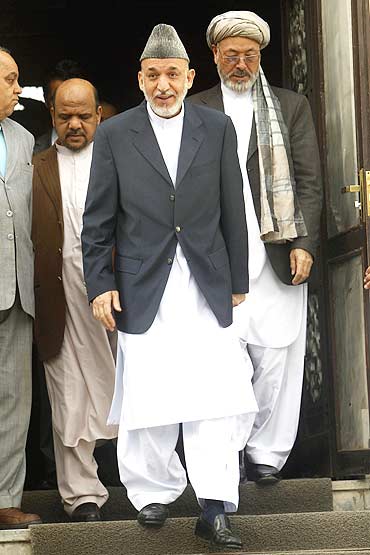
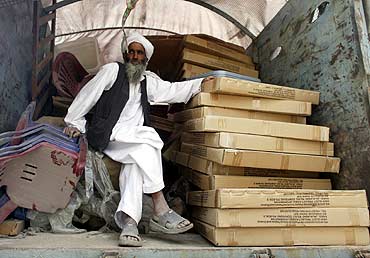
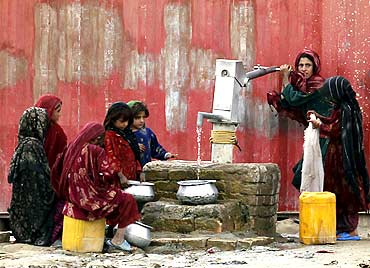
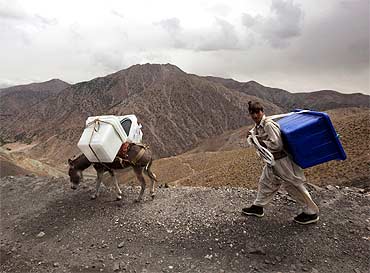
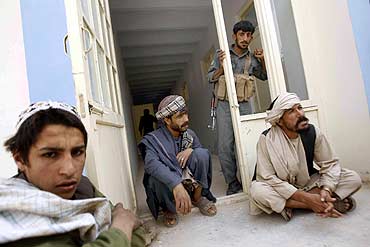
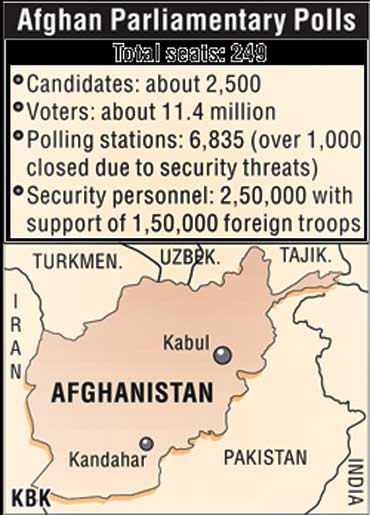
article